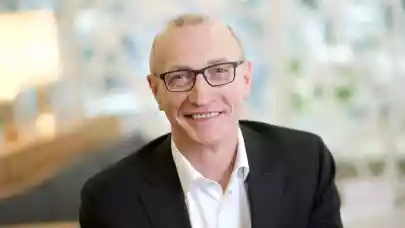
Avison Young has significantly increased its CEE presence in recent months and the company is planning further expansion. Gerry Hughes, Principal and President of Avison Young Europe talked to Property Forum about the firm’s strategy for CEE and shared his expectations regarding the future of the advisory business.
In recent months, Avison Young opened three new offices in CEE – in Hungary, the Czech Republic and Bulgaria. What inspired such a significant expansion in this particular region? Why now?
Europe is a priority for Avison Young in terms of our expansion and growth globally, so we're investing a lot in expanding our business right across the continent. That investment started a number of years ago in Germany and then Romania, but the big move was two years ago when Avison Young bought UK company- GVA, which was also present in Poland. I was Chief Executive of GVA at the time, so my role changed to take on the expansion of the Avison Young business across the continent, and increasingly into Africa and the Middle East.
So overall, we're growing. Why specifically Central and Eastern Europe? Well, we see that as a key region for us in Europe for a number of reasons. We're already in the region, with offices in Poland and Romania. We have clients who are telling us that they want to invest in CEE and obviously we're responding to their requirements for our services across the whole CEE region. They see a relatively stable economy in Central and Eastern Europe and they see it as an attractive location for investment. They see an opportunity for their businesses to grow in CEE and as an advisor, we're seeking out opportunities for them.
Why now? Well, it's not really a case of ‘why now’. We've been looking at expanding in the region for two years and we were hoping to open new offices in 2020, but COVID happened which slowed down the process a little bit. We carried on with our discussions with several organizations and a number of people and arrived in a position to actually expand in the early part of 2021. We're not finished yet, we're progressing with expanding into other countries in CEE in the coming months.

Gerry Hughes
Principal and President
Avison Young Europe
In the Czech Republic you established a branch from scratch while in Hungary and Bulgaria existing service providers took on the Avison Young brand. What can you tell us about how these three agreements came into being?
There are two things that are important to us when we're looking for organizations and people to bring into Avison Young. The first is quality. The quality of the talent, the quality of the service and the quality of the business if it's a business we're buying. So we spent a lot of time making sure the quality thresholds that we have as a company are being met. And the second thing is culture. We're very proud of our people-oriented culture, we value the fact that we are a partnership where we really build our strengths from working together within teams. We operate as a team where we are respectful to the views of our people. And when we bring that approach to serving our clients, we build relationships with our clients. So, we spent time finding people or businesses that have that partnership culture and hence we arrived at the partnerships in Hungary, the Czech Republic and Bulgaria.
The reason why we're setting up a business from scratch in the Czech Republic relates to our current business in Romania. The leader of our Romanian operation, David Canta, was doing business in the Czech Republic from Romania but wanted to set up a local operation in Prague. We supported him in doing that and worked with him to find the right leadership for that business. We identified Ryan Wray – with his impressive track record and excellent network – and brought him on board. This is a slightly different way of doing it compared to the partnerships we have in Hungary and Bulgaria, but the end-result is the same. We're going to have businesses with the same culture across Avison Young, in all three countries.
Where do you plan the aforementioned further expansion? Based on the map of Avison Young offices, Austria and Slovakia seem like missing links.
We’re actively looking across CEE – in places like Austria, Slovakia, Greece and the Balkan countries – and you can expect more announcements from us yet this year. In addition to that, we will continue to expand our already strong business in Poland under the excellent leadership of Michal Cwiklinski. We're expanding our services to include valuation consulting, we're building up our technical due diligence capability and we're moving into the logistics market. We'll continue to invest in expanding our service offer in other CEE countries as well.
The real estate advisory market in the region has seen a lot of movement in recent years with brand new ventures and strategic affiliations. What’s your strategy for growth in such a competitive market environment?
I'd highlight two approaches here that are a priority for us - the partnership approach and the lifecycle approach. First, our approach is to align ourselves with our clients, understand their business requirements and then give them advice that allows them to realise their real estate aspirations or fulfil their needs. We do that by entering a partnering relationship with them. Our aspiration is to be an advisor that has a long-term relationship with our clients that is built on trust, respect and knowledge of each other's business. Second, we seek to give our clients advice all the way through the lifecycle of a real estate asset. And to do that, of course, you must have the skillsets that allow you to advise clients across the lifecycle, and not to forget the earlier mentioned focus on quality which ensures repeat business.
How was the year 2020 for Avison Young globally and in Europe?
Last year was challenging for the company globally, as it was for the entire market. We reacted very quickly to the onset of COVID by enacting our business continuity measures and taking control of our costs. To protect our people, we allowed staff who were able to work remotely the option to work from home, no questions asked. We stopped travelling and we took control of discretionary spending because we could see that revenues were going to be impacted relatively quickly. And we did the right thing because once revenues started to be impacted, we had control over our cost outlay. Throughout 2020, we did lose some people along the way as part of the cost containment process, but every business had done the same thing. Our financial backers, including Canadian pension fund CDPQ, were very supportive of us all the way through and continue to be supportive of us. What that has meant is that we have started 2021 very strongly. We were on budget at the end of the first quarter globally and in every one of our regions. And that's because we now have a much more effectiveness.
What are your expectations for the rest of 2021?
My personal view is that we won't get back to whatever normal is in 2021. For the rest of this year, we'll be operating under some form of restriction, which will probably slow our growth down. What I do notice is that investors are getting impatient as they have investments they want to make and they have money they want to spend, though they remain focused on particular sectors and assets. Despite this, we see an uptick in investment activity across pretty much every region of Europe, including CEE. This investment activity will fuel the rest of the real estate market and there's no sign that it will stop, rather it will increase over the course of the year.
In addition, we are seeing ESG coming to the fore as a consideration for investors and informing the decision making of occupiers. We are responding by investing in skills and capabilities in this area as we expand.
COVID-19 is rewriting the rules in many segments of the real estate industry. How do you expect the pandemic to affect the advisory business in the long run?
It has already had a number of impacts. First, it has brought to the fore the importance of client-advisor relationships. Having been able to be there for our clients through a difficult time will mean, we hope, that they will be loyal to us. So I think it's really strengthened the bond between client and advisor.
Second, it increased the importance of innovation and technology. One thing that we have not cut back on all the way through COVID is our investment in technology to bring real-time data and intelligence to our clients. The pandemic was often referred to as ‘unpredictable’ and ‘unprecedented’ – and in those circumstances – you need the latest data to inform your decision-making. I think that working from home has really shown us the power of technology and that's going to continue and further accelerate. Real estate, by tradition, is a conservative sector but we are seeing an acceleration of the adoption of prop-tech and innovation in general.
Third, and this is an obvious thing that everyone's talking about, is that we're much more adaptable and flexible in terms of where we work. I am a firm believer in the office and the value of face-to-face meetings, but it’s important to note that businesses are accepting that their staff can work effectively away from the office even though there are certain times where it's better to meet in person to drive collaboration and innovation.



